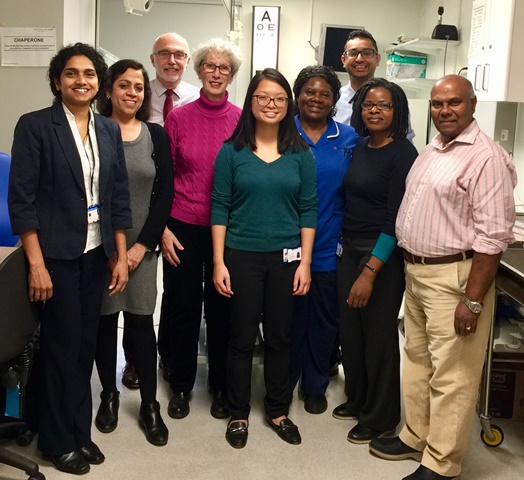
Barnet Hospital has recruited the first European patient to take part in an international study exploring a potential new treatment for wet age-related macular degeneration (AMD).
The hospital was recently highlighted as a leading provider for eye health, that offers high quality research trials, by the principal organisation for clinical research in England.
Mr Hemal Mehta, consultant ophthalmic surgeon, leads ophthalmology clinical trials at Barnet Hospital. The latest research project, which is in an early phase, aims to establish the effectiveness and safety of a new eye drop to treat wet AMD.
Wet AMD occurs when abnormal blood vessels grow underneath the retina. These unhealthy vessels leak blood and fluid, which can prevent the retina from working properly and lead to permanent loss of central vision. It doesn’t usually cause total blindness but it can make every day activities difficult, such as reading or recognising faces.
Mr Mehta explained: “At the moment, we use injections to stabilise wet AMD and patients often need to have these every month or two.
“The potential benefits of using eye drops would be that fewer or possibly no injections would be needed, so it would be safer and less unpleasant for the patient, and also more convenient for them and their relatives who would not need to attend hospital so often. We need clinical trials to establish how well these new drops work.”
The injections contain medicines called anti-vascular endothelial growth factor agents that reduce the growth of new blood vessels. The molecules in the eye drops are a thousand times smaller than those in the injections, which means they can enter and penetrate the eye more effectively.
Research to establish how well the eye drops work is being conducted 22 centres across the United States and Europe. There are strict criteria for inclusion in the trial so not all patients with wet AMD can participate.
Mr Mehta identified Mrs Sue Freedman as an eligible patient, and asked her if she would like to know more about the trial. Mrs Freedman, 77, was keen to be involved and has completed 12 weeks of treatment on the trial. She enjoys painting but was having problems with her sight and thought it was due to cataracts.
She said: “One of my friends said to me 'that's not the colour you think it is'. Everyone speaks very highly of Barnet Hospital so I got an appointment there.
“Mr Mehta told me my cataracts are not bad, but I have wet age-related macular degeneration.”
“He asked if I would be interested in the research programme and I said ‘yes, absolutely.’ I think it is a good thing to help learning and I felt confident about safety because it is through the NHS. He explained everything about it, and he and his research team have been lovely.”
“I put in one drop every day – it is very easy and not at all unpleasant. I would prefer to have eye drops rather than injections so I hope it will prove successful.”
Mrs Freedman initially went to Barnet Hospital every two weeks, then once a month until the first phase of the 12-week trial ended on 17 December 2018.
She added: “I would recommend other people to take part in research trials to help find future cures for diseases.”
If the early phase trial shows the eye drops are effective, larger groups of patients will be recruited for further studies. If these results are positive, it would be at least five years before the drops are available to the general public.
A report by the North Thames Clinical Research Network, part of the National Institute for Clinical Research, said recruiting to the trial gives an important message to patients about opportunities to take part in NHS research studies.
Find out how you could get involved with clinical research at www.royalfree.nhs.uk/research
 Translate
Translate